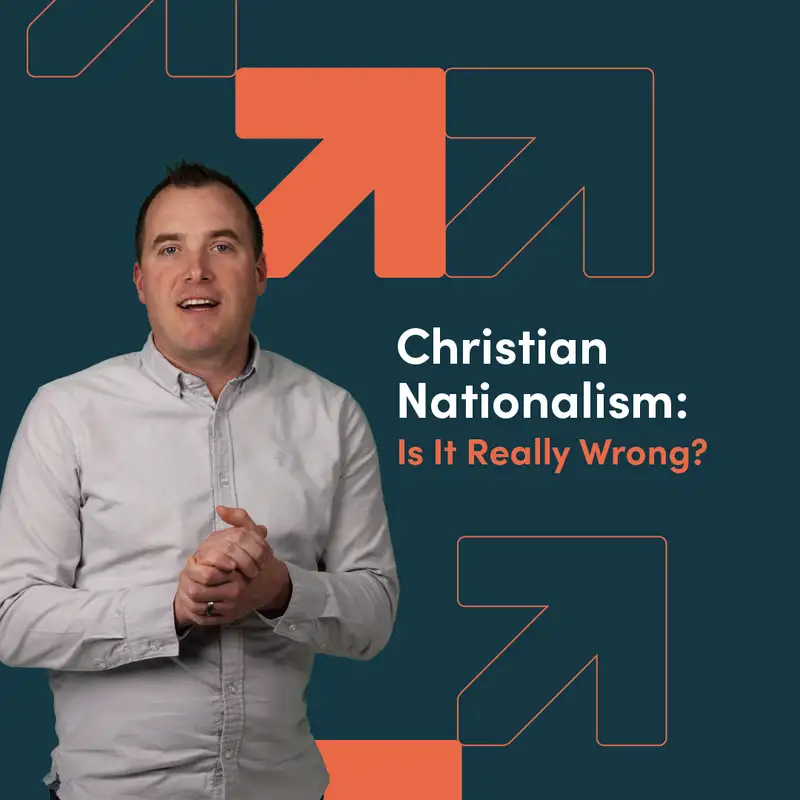Christian Nationalism: Is It Really Wrong?
Hello, everyone, and thanks for listening to Wake Up, Look Up, a podcast where we connect events happening in real time to the gospel of Jesus Christ.
I'm Zach Weihrauch, and in today's episode, we're talking about Christian nationalism, and we're asking the question, is it really wrong?
Now, this is prompted by an article I read recently on CNN's website about a pastor in Idaho, Douglas Wilson, who is advocating a kind of Christianity that that seeks to turn the country and eventually the globe into a Christian country and a Christian world.
Now, what Pastor Wilson means by that is a country and world surrendering to the kingship of Jesus, a place where a number of reforms are enacted representing his own brand of Christianity, things like women losing the right to vote, criminalizing homosexuality, things of that nature.
And what the article is exploring is his rapidly growing influence. In fact, his movement now comprises 150 plus churches, schools, publishing house, and a new church plant in Washington, D.C., which counts Secretary of Defense Pete Hegseth as one of its parishioners.
And the concern of the article and most of the coverage is is that this represents the growing tide of Christian nationalism, a movement of Christianity that seeks to influence and impose its faith on the larger world around it.
Now, my question, of course, is how should we be thinking about Christian nationalism from a biblical lens?
I hear this phrase being thrown out a lot. Well, let me offer two kind of negative caveats, and then, in some ways, a full-throated defense of of Christian nationalism.
Here are my caveats. First, I'll say this. Pastor Wilson's theology is rooted in something called postmillennialism. He believes that the Bible teaches that the role of the church today is to usher in the kingdom of Jesus.
And that once the kingdom of Jesus is established on this earth, Jesus will return and that will be the end of all things.
In other words, he literally believes the church can usher in heaven. I don't believe in post-millennialism. Part of the reason for that, outside of, I think, what the Bible says and doesn't say, is that it makes Christianity very much so this-worldly.
The problem with that, of course, is think about the Gospel of John when Pilate says to Jesus, don't you know I have the power for you to live and die?
Are you a king or not you? Jesus says to Pilate, and I quote, "...my kingdom..." is not of this world. Now, what I think Jesus means is that his kingdom is bigger than this world.
It's not smaller than this world. It certainly impacts and influences this world, but it spans generations. It spans history. He's telling Pilate, you exist in a small moment in a small civilization called Rome.
Long after Rome is gone, my kingdom will keep moving. Pastor Wilson is seeking to make the kingdom of God, in my opinion, very much so this worldly, and he's losing sight of what Jesus was saying.
He's also representing a number of views that I just don't think square with Scripture, views like women losing the right to vote.
Those are troubling views even within the realm of evangelical Christianity. So in no way what I'm getting ready to say is intended to be a support of Pastor Douglas Wilson.
I am not a supporter of his. Having said that, The secular pushback against Christian nationalism is very troubling to me because it seems like what they mean by Christian nationalism is not the idea of Christians rising to political power and then utilizing that power to oppress and coerce, which of course would be monstrous.
I don't want a Christian president that throws people in jail for not being Christians. In fact, I can't think of something less Christian to do.
But I do want a Christianity that impacts this world. It seems to me that what gets you labeled a Christian nationalist is simply the idea that your faith should influence and inform how you live, how you vote, and what you want for the world.
But that's how everyone's worldview shapes them. Secular people are secular nationalists. They desire for their secularism to be imposed on this country.
If that weren't the case, we wouldn't have legalized abortion. We wouldn't have legalized same-sex marriage or marijuana. All those things are about their worldview being brought to bear.
Do I get to label them secular nationalists and write scathing articles about it? Look, the whole definition of democracy and pluralism is that different people bring their worldviews to the public arena where ideas compete.
And in that competition, all of us should be after conviction and convincing, not coercion. But Christians are like everyone else. We desire for those around us to see the truth of what we believe.
We desire for people to come to know God through a relationship with Jesus Christ, to repent from sin and to surrender to his kingship.
Surely, that will have real-world implications for some of which will be political. And that's okay. Look, the apostles said it this way in Acts chapter 5, we must obey God rather than men.
And I'll just say this, if you think that the idea that my faith should shape the world around me, that I want the world to meet Jesus, makes me a Christian nationalist, that label isn't going to shut me up.
Because in the words of the apostle Paul, I'm a pleaser of God, not of men. Over and over again, the Bible says that our faith must impact the world.
The prophet Isaiah calls us to seek justice and correct oppression. Jesus himself calls us a city set on a hill, a light to the world, salt on the earth.
So yes, your faith should inform how you vote, how you live, how you wield your influence and what you want for the world.
And I'll tell you, If America ever could legitimately become a country that looked to the kingship of Jesus, it would be the greatest time in the history of our country.
Not because a ruler threatens us, and so we do it. I'm talking about legitimate conversion. I would pray for that all day long. Christian nationalism can be an awful thing if it means wielding power to force people to Jesus.
But if it means a faith that changes the world, guess what? That's not Christian nationalism. That's biblical Christianity.
Hey, thanks for watching this episode of Wake Up, Look Up. If you enjoyed it, please help us get the word out by sharing it with someone you think might benefit from it. And, while you’re here, make sure to subscribe to our YouTube channel to get further content or even download the CCC app where you'll find even more resources to help you grow in your faith and relationship with Jesus Christ.
Creators and Guests


